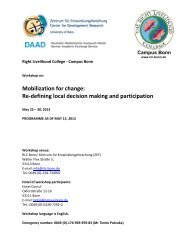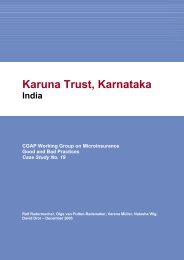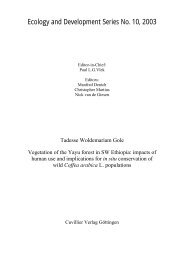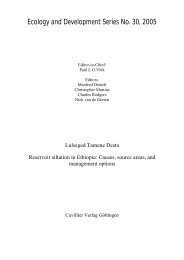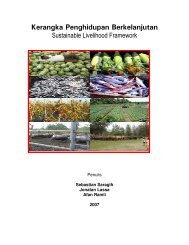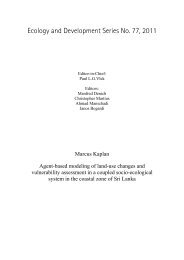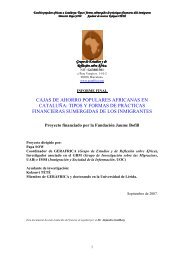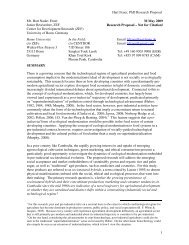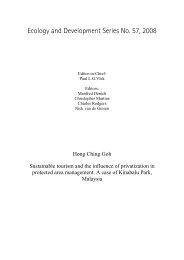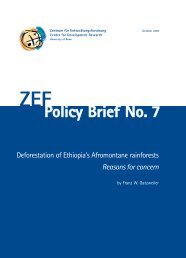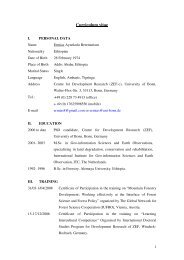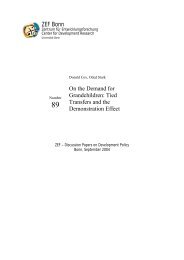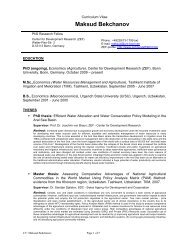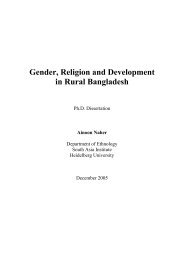ZEF Bonn
ZEF Bonn
ZEF Bonn
Create successful ePaper yourself
Turn your PDF publications into a flip-book with our unique Google optimized e-Paper software.
Thailand. The findings of this recently finished research suggest that barriers to<br />
modern health care access can be overcome by community-financing (CF) schemes<br />
even in the context of extreme poverty. However, the determinants of participation<br />
in CF schemes have also shown a differentiation within the strata of the poor.<br />
Differences in access exist among the various countries. Whereas in Rwanda and<br />
India income turned out to be a non-significant variable in explaining participation,<br />
the probability of participation increases with a higher disposable income in<br />
Thailand and Senegal. This finding can be taken as an indication of implicit design<br />
and implementation features that allow communities to overcome the inability of<br />
the poorest of the poor in a community to participate in such schemes.<br />
Regarding the scheme design, it seems that the fee collection procedure is of utmost<br />
importance for the integration of the poor within the community. Fees could be<br />
collected in cash or kind; there could be exemption mechanisms for the poorest;<br />
and the period when the premium is collected also matters. Finally, demandtargeted<br />
subsidies by charitable organisations or the government can help to promote<br />
the participation of the poor. These findings have important policy implications.<br />
Participation in local organisations is not cost-free and requires a minimum of income<br />
which the most disadvantaged often do not have at their disposal. Therefore,<br />
donors and policy-makers should be aware that it may be very difficult, even impossible,<br />
to reach the poorest part of the population when promoting participation in<br />
local organisations and institutions. In order to reach the poorest members of the<br />
community, the cost of participation would have to be reduced by the institutions<br />
themselves or the public sector would have to subsidise their premiums.<br />
2.2 Access to information<br />
In the area of technical change, a focus of <strong>ZEF</strong>'s research on<br />
poverty and equity lies on information and communication technologies<br />
(ICTs). Scholars within economics, geography and from<br />
a business administration-background address the related ICT<br />
research issues. These technologies have the potential to substantially<br />
reduce<br />
problems of the poor resulting from a lack of information.<br />
Accessibility of ICTs and the Internet in particular is partly an<br />
issue of the physical availability of the service but is also related<br />
to complex socio-economic problems such as income, education,<br />
political influence, etc. The poor, especially those who reside in<br />
the rural areas where even the basic telecom services may not be<br />
available, are suffering from precisely the lack of communication<br />
on markets with the outside world and information that may<br />
enable them to escape poverty, such as that on public services.<br />
A study on the rural telecom service in Lao PDR was undertaken<br />
to identify the impact of the basic telecom service, voice telephones,<br />
on the welfare of rural households. A household survey<br />
shows that telephone users were likely to be literate, to have<br />
completed more years of education than non-users, and to be<br />
more skilled. Despite this general pattern we also found that<br />
usage rates were quite substantial among the low-income group<br />
and those carrying out less-skilled jobs. Households from the<br />
poorer quintiles spend almost the same amount on telecom ser-<br />
Research<br />
Access to information and<br />
communication technologies<br />
in Bangladesh<br />
33



